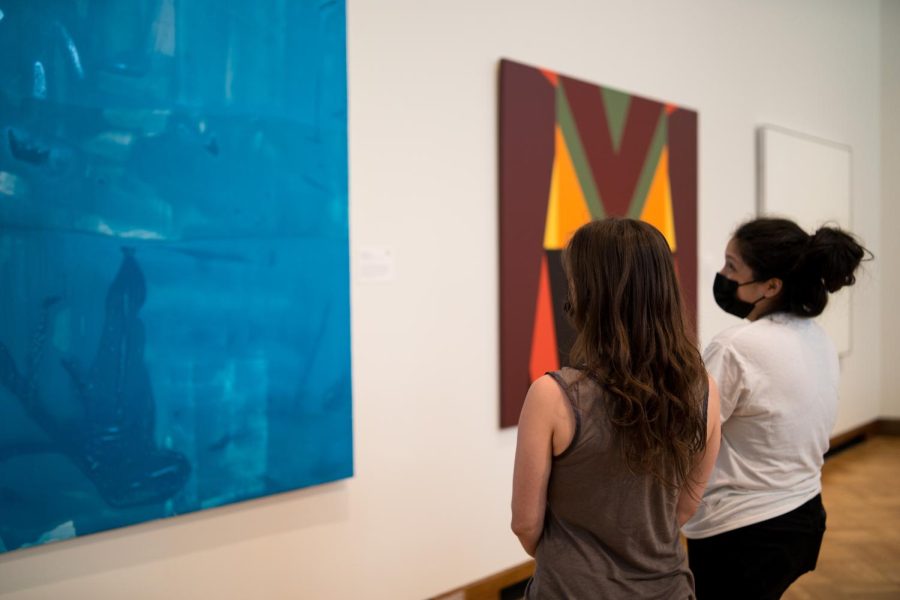Oberlin to Offer Five New Academic Programs
Students often visit the Allen Memorial Art Museum to augment their learning in the classroom by viewing artwork relevant to the curriculum.
Oberlin has approved five new academic programs for the 2022–23 academic year: integrative concentrations in Public Humanities and Data Sciences, a minor in Spanish, and Conservatory minors in African-American Music and Improvisation. All three of the new Arts and Sciences programs will require an experiential component, and the integrative concentrations will also require a learning portfolio. Both students and faculty have expressed excitement about the new opportunities these programs offer.
Associate Dean of the College of the Arts and Sciences Laura Baudot explained that these programs began with faculty proposals. The proposals were subject to review by the Educational Plans and Policies Committee before eventually being voted on by the general faculty.
Spanish Minor
The new Spanish minor will include a minimum of five Hispanic Studies courses taught in Spanish and an additional course taught in English. The minor will also require an experiential component like a study-away program or Spanish-language internship.
Integrative Concentration in Data Sciences
According to Chair of Psychology Nancy Darling, the Data Sciences concentration emerged from meetings with other chairs from departments in the quantitative, natural, and social sciences.
“All of us have really strong interest in data, but in really different ways,” Darling said. “Psychologists collect and play with data, and we’re really good at stats and things, but computer science is playing with different types of data.”
Darling hopes the program will appeal to a range of students from a variety of backgrounds.
“Data science is incredibly broad, so it should fit psychologists who are really good at building datasets … and computer science models, and people who are doing artificial intelligence — all of those are data science,” she said.
Darling also emphasized the importance of experiential learning for students as they prepare to join the workforce and make decisions about what they want to do after college.
“You don’t know what you’re interested in until you do it,” she said.
The concentration requirements include taking five related courses that may come from a variety of departments such as Biology, Psychology, Computer Science, or Environmental Studies.
Integrative Concentration in Public Humanities
The Public Humanities concentration requires students to take Introduction to Public Humanities, a community-based learning course, a theory and methods course, and three other Public Humanities classes.
Co-chair of the Public Humanities integrative concentration Renee Romano cited various campus efforts that connect students with the public — like ethnomusicology projects and the Philosophy in the Schools program — as inspiration for the Public Humanities program.
“In conversation with people, we thought we should pull all these resources together and give it some structure and some coherence so people can really recognize the work that’s happening and help students recognize what they’re doing,” she said.
When designing the Public Humanities concentration, the committee prioritized a curriculum that would emphasize collaborative, community-based learning.
“One of the big things about public humanities — that’s central to its DNA — is what’s called shared authority,” Romano said. “So it’s not just, ‘Here we are on high from the academy; … let us bless you with our knowledge.’ It’s, ‘How can we be co-constructors of knowledge and really work with communities to co-construct?’”
College second-year Zach Terrillion hopes that the program will provide him with an opportunity to connect his English major with coursework in museum and archival studies.
“I have strong experience in museum work through both my community and at the [College], and I want to see how my English major could specifically apply to these more public/informational fields,” he wrote in an email to the Review.
Minors in African-American Music and Improvisation
Peter Swendsen, senior associate dean of academic affairs for the Conservatory, hopes that the Conservatory’s new minors will provide opportunities for students from varying disciplines to collaborate with one another.
“One exciting element is that, even in these very early days, we see students coming to these areas from a wide variety of majors and disciplines,” he wrote in an email to the Review. “We are looking forward to those students having a common cohort and the opportunity to bring and share … varied expertise and interests with each other.”
Swendsen hopes these minors will serve as structured programs that complement preexisting student interests. Students have already reached out to his office to express interest in these new programs.
“We also know that many students are already deeply engaged in these areas through their existing course work, lessons, and ensembles,” he wrote. “All of those areas have been steadily growing over the last few years.”
Students interested in the new programs can find more information about requirements and classes in the 2022— 23 course catalog.







